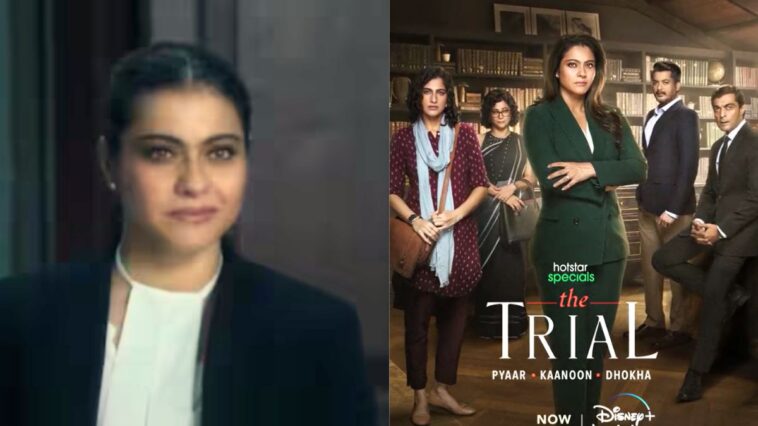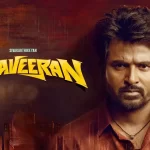Trial- Pyaar Kaanoon Dhokha: The Indian adaptation of The Good Wife, titled The Trial- Pyaar Kaanoon Dhokha, contains enough narrative flaws and a palpable lack of dedication to the subject matter to establish culpability. Noyonika Sengupta (Kajol), whose spouse Rajeev (Jisshu Sengupta) is imprisoned for a sex scandal, must deal with unwelcome media attention as she attempts to rebuild her life from the ground up. Don’t ask for explanations because the show is more concerned with displaying unnecessary skin-show than establishing any type of context for the upcoming eight-part story.
The predicate
Noyonika, after shedding a few tears with her two daughters about the future, struts her way to a top firm (never mind that she is twenty minutes late) and becomes the junior counsel as if it were a piece of cake. Her initial visit, and lo! She is advocating for her client in court, where even the judge recognises her due to her husband’s actions. The six-month probation seems like a farce because she is not in any sort of difficulty. In the very first episode, she has relocated to a new flat, is living with her regressive mother-in-law and daughters, and is engaged in a high-profile legal case. According to The Trial (written by Hussain Dalal, Abbas Dalal, and Siddharth Kumar), it is considered a struggle to sell a Mercedes and reside in a completely furnished flat (which is referred to as small on multiple occasions). No wonder, as I am the only one still seeking nuance in the aesthetics of this show.
The show’s actors and actresses
The format is conventional. In each episode, Noyonika climbs the ladder to battle a new case. Noyonika, however, is not Annalise Keating from How to Get Away with Murder. Her hair is always perfectly blow-dried and crimped, and her pastel-colored business attire is always ironed. The world around her appears to have been altered to better suit her. The majority of the time, she is assisted by her colleagues, who, as expected, include a former college flame in the form of Vishal (Ally Khan), a go-getter associate in the form of Sana (Kubbra Sait), and an eternally cheery co-chair in the form of Malini (Sheeba Chaddha). If these paper-thin supporting characters weren’t enough, there is also a cop portrayed by Aamir Ali who is a distant fan of Kabir Singh, and a news anchor named Daksh who delights in creating controversy.
Poor dialogues
Six episodes into The Trial, the closing credits are proclaimed by Noyonika’s delivery of yet another piece of mind-numbing dialogue. “Iss duniya mein do tarah ki pyaar hote hein. Ek jo hum deserve karte hein…doosra jo hum desire karte hein. Aur iss sab ke upar hoti he destiny, jisse koi nahi jeet sakta (In this universe, there are two forms of love. One is what we deserve, while the other is what we want. However, there is a fate that cannot be overcome.” But this particular moment is preceded by a conversation in which an old colleague makes a sexually suggestive remark about not being attracted to a female law firm employee. Who is Noyonika speaking to here? Is she having an interior dialogue? Everything is a muddled and pretentious mess. Even the dependable Sheeba Chaddha suffers the same fate as a weakly written boss-lady archetype.
Loud and superficial
Even Kajol is unable to save The Trial from its own conception of law and justice. Her performance is frequently boisterous and off-key, with her natural vivacity contributing nothing to her cause. The format of the narrative is intended to be such that each new case exposes a socio-economic crisis, prejudice, or dilemma, and then ties it back to how it relates to Noyonika’s personal life. In The Trial, the two realms become increasingly artificial and distant. Noyonika’s personal life intrudes upon the plot like a never-ending television soap opera with blaring background music. And it is best if nothing is said about the appalling use of background music. In eight episodes, there is hardly ever a moment of silence.
Possibly the most annoying and creepy aspect of the entire series has been reserved for last. The audience is repeatedly shown that Noyonika’s daughters are more interested in viewing their father’s sex tape. These ladies alone discover the truth about the photographs. More often than not, the investigation of that part is secondary to the skin-show. Suparn appears to have given no consideration to how to position and execute these scenes; they feel grossly inappropriate and demonstrate a shocking lack of perspective on the subject matter’s treatment. The Trial is excessively boisterous, forgettable, and underwhelming, and it lacks a much-needed framework of perception, whether legal, judicial, or otherwise.
Also read this:Mission: Impossible – Dead Reckoning Part One review: Tom Cruise battles AI this time
The Trial- Pyaar Kaanoon Dhokha is currently available to stream on Disney+ Hotstar.




